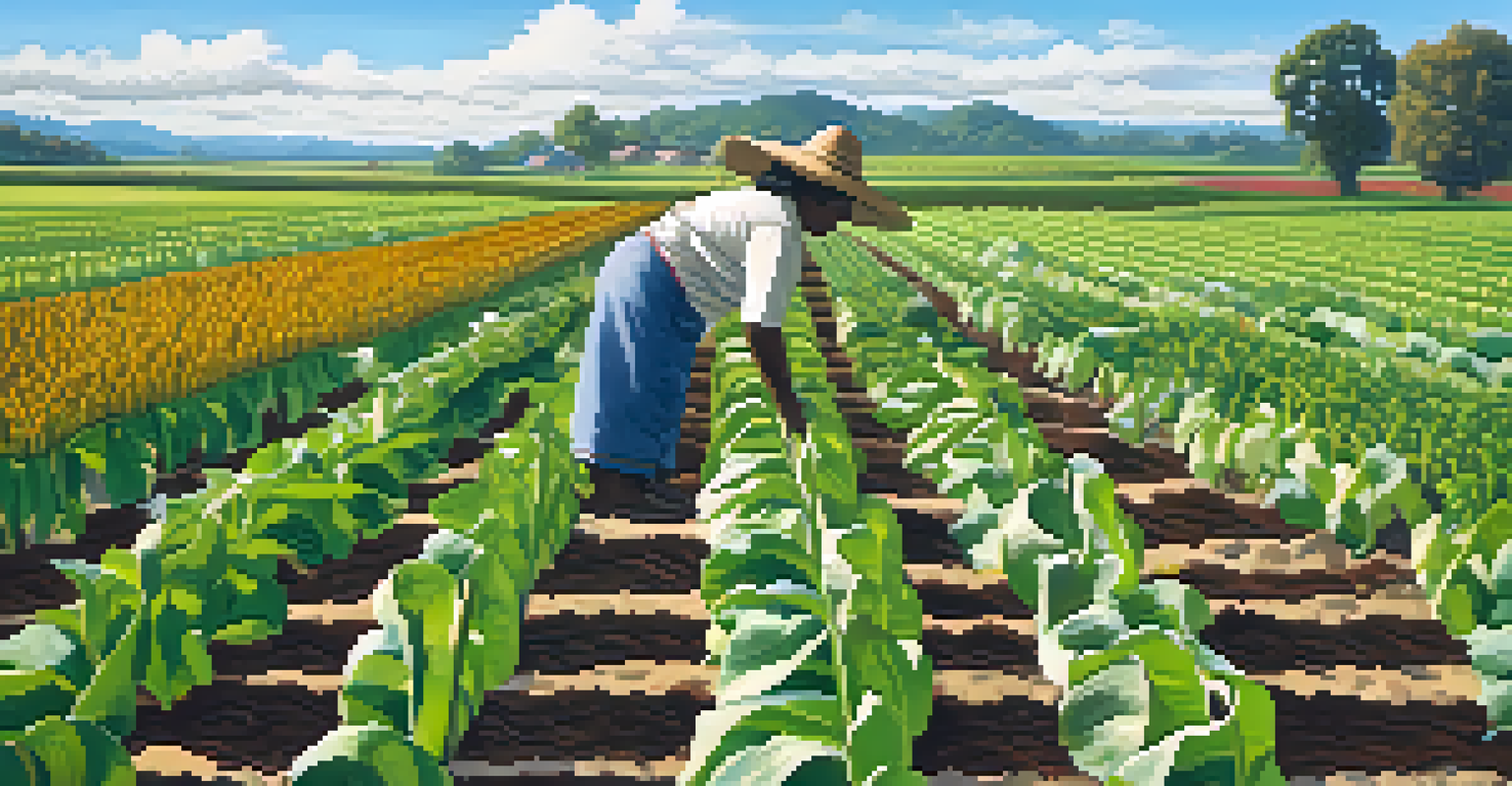Indigenous Spiritual Practices and Their Ecological Wisdom

Understanding Indigenous Spirituality and Its Roots
Indigenous spirituality encompasses a deep connection to the land, ancestors, and the cosmos. It is often rooted in oral traditions, which pass down teachings and beliefs through generations. This holistic approach emphasizes the interdependence of all living beings, recognizing that humans are just one part of a larger ecosystem.
The land is not just a resource to be exploited; it is a sacred trust that must be protected.
Many Indigenous cultures view the Earth as a living entity, deserving of respect and care. This perspective shapes their relationship with nature, guiding practices that prioritize sustainability and conservation. For instance, rituals may be performed to honor the land, showcasing gratitude for the resources it provides.
By understanding these spiritual roots, we can appreciate how Indigenous cultures cultivate a profound ecological wisdom that can benefit modern environmental practices. This wisdom often includes knowledge of local ecosystems, sustainable harvesting methods, and seasonal cycles, all vital for maintaining balance in nature.
The Role of Rituals in Ecological Stewardship
Rituals play a crucial role in Indigenous cultures, serving as a way to connect with the environment and reinforce communal ties. They often involve ceremonies that celebrate seasonal changes, planting, and harvesting, highlighting a respect for nature's cycles. These rituals instill a sense of responsibility toward the land and its resources.

For example, many Indigenous communities hold ceremonies to give thanks after a harvest, emphasizing gratitude and reciprocity. This practice not only honors the Earth but also reminds community members of their role as caretakers. The act of giving thanks fosters a mindset centered around stewardship and care.
Indigenous Wisdom and Ecology
Indigenous spirituality emphasizes the interconnectedness of all life and fosters sustainable practices that respect the Earth.
Through these rituals, Indigenous groups demonstrate sustainable practices that have been passed down for centuries. Such traditions can inspire contemporary society to adopt similar approaches, emphasizing the importance of living in harmony with nature rather than exploiting it.
Traditional Ecological Knowledge (TEK) Explained
Traditional Ecological Knowledge (TEK) refers to the understanding Indigenous peoples have gained through centuries of living in close connection with their environments. This body of knowledge encompasses practices related to agriculture, resource management, and biodiversity conservation. TEK is often shared through storytelling, illustrating its importance in community culture.
Indigenous peoples have a unique relationship with their environment that can teach us how to live sustainably on this planet.
For instance, Indigenous farmers may use crop rotation and companion planting techniques that enhance soil health and yield. These practices are grounded in observations of natural systems, demonstrating a sophisticated understanding of ecological balance. By valuing TEK, we can learn sustainable practices that align with the rhythms of nature.
Integrating TEK into modern environmental management can enhance biodiversity and resilience in ecosystems. It represents a valuable resource for finding solutions to contemporary environmental challenges, reminding us that ancient wisdom can complement scientific approaches.
Sacred Sites and Their Ecological Significance
Sacred sites often hold deep spiritual significance for Indigenous peoples, serving as places of worship, reflection, and connection to the ancestors. These locations, which can range from mountains to rivers, are viewed as integral to cultural identity and ecological health. Protecting these sites is crucial for maintaining Indigenous cultures and their ecological knowledge.
For example, many Indigenous communities advocate for the preservation of sacred lands, emphasizing their ecological importance. These areas often harbor unique biodiversity and serve as critical habitats for various species. By recognizing the ecological value of sacred sites, we can better understand the intertwined relationship between culture and nature.
Rituals Foster Environmental Stewardship
Ceremonial rituals in Indigenous cultures reinforce communal ties and instill a sense of responsibility toward ecological conservation.
Preserving these sacred spaces not only honors Indigenous heritage but also supports biodiversity and ecosystem health. It highlights the need for collaboration between Indigenous groups and environmental organizations to protect these vital areas.
The Connection Between Spirituality and Conservation
Indigenous spirituality fosters a deep sense of responsibility toward the environment, often framing conservation efforts as acts of reverence. For many Indigenous cultures, the land is not just a resource; it is sacred and demands respect. This belief system shapes their conservation practices, which prioritize the wellbeing of the Earth.
Many communities actively engage in conservation efforts, applying their traditional ecological knowledge to protect natural resources. For instance, Indigenous-led initiatives often focus on restoring habitats, protecting endangered species, and promoting sustainable land management practices. These efforts highlight the importance of integrating spirituality into conservation work.
By recognizing the spiritual dimensions of conservation, we can cultivate a more holistic approach to environmental stewardship. It invites us to reflect on our own relationships with nature, encouraging us to adopt practices that honor and protect the Earth.
Modern Challenges Facing Indigenous Ecological Wisdom
Despite the profound wisdom embedded in Indigenous practices, modern challenges threaten their continuation. Climate change, land dispossession, and loss of biodiversity are pressing issues that disproportionately impact Indigenous communities. These challenges not only affect their traditional ways of life but also the ecological knowledge they possess.
As development projects encroach on sacred lands, Indigenous voices often go unheard, leading to a loss of cultural and ecological heritage. This marginalization can result in the erosion of traditional practices and knowledge, making it difficult for future generations to connect with their roots. The fight for land rights is crucial in preserving Indigenous ecological wisdom.
Facing Modern Challenges Together
Indigenous communities face significant threats to their ecological knowledge, and addressing these requires collaboration and respect for their sovereignty.
Addressing these challenges requires collaboration and respect for Indigenous sovereignty. By amplifying their voices and incorporating their knowledge into broader environmental strategies, we can work toward a more equitable and sustainable future.
Learning from Indigenous Wisdom for a Sustainable Future
As we face increasing environmental issues, there is much to learn from Indigenous spiritual practices and ecological wisdom. Their holistic approach emphasizes interconnectedness, reminding us that our actions have far-reaching consequences. Understanding and integrating these perspectives can lead to more effective environmental solutions.
Many contemporary environmental movements are now recognizing the value of Indigenous knowledge in tackling climate change and biodiversity loss. By collaborating with Indigenous communities, we can create strategies that honor their practices while addressing urgent ecological concerns. This partnership can lead to innovative solutions grounded in respect and reciprocity.

Ultimately, embracing Indigenous wisdom is not just about conservation; it's about fostering a deeper relationship with our planet. By learning from these practices, we can cultivate a sustainable future that honors both the Earth and its original stewards.